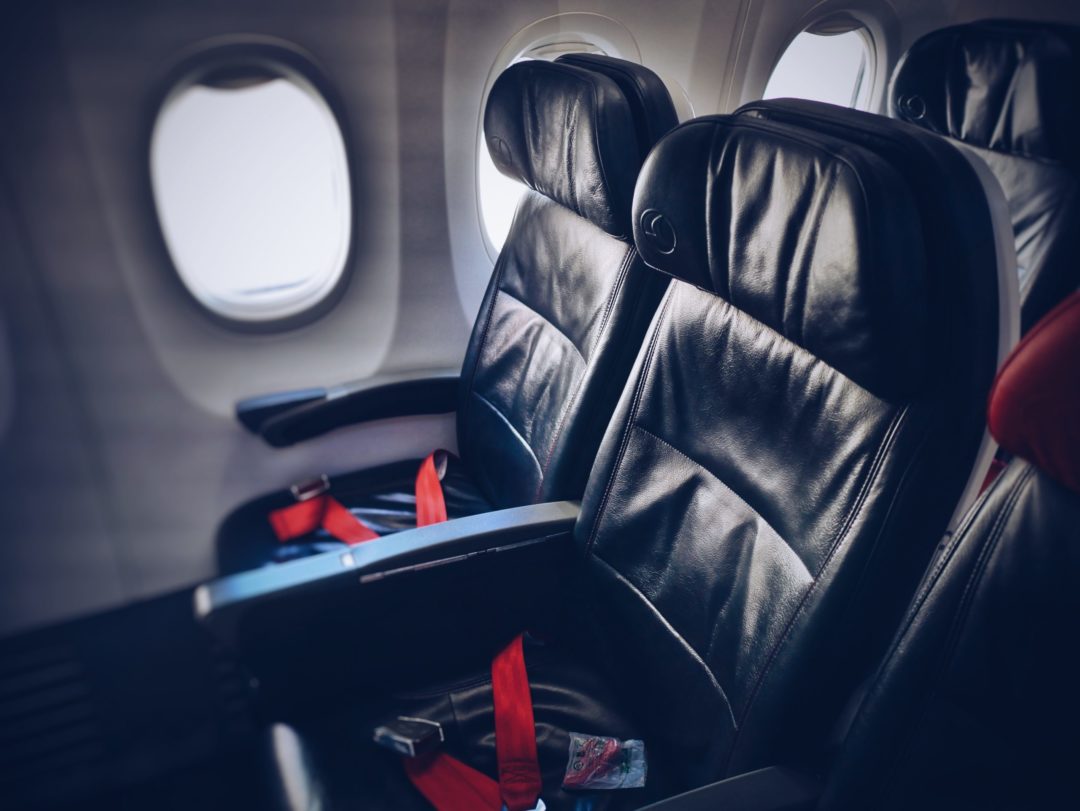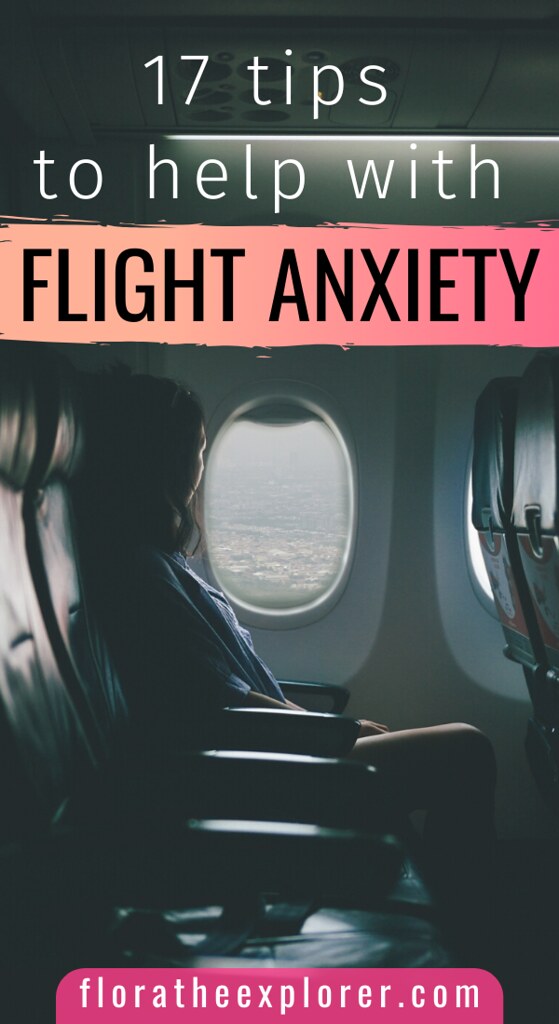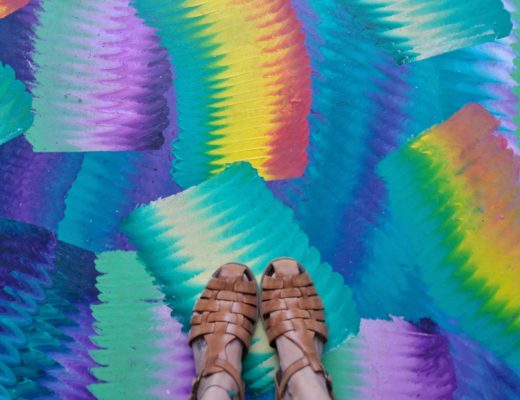What do you do if you’re an anxious flyer who loves to travel?
To be perfectly honest, I’m still trying to feel my way through this one. Because every time I board a plane, I have to quell a near-constant flutter of panic in my stomach; a myriad of catastrophic thoughts careening through my mind; and a tendency to break out in a cold sweat at the tiniest hint of turbulence.
Also I need to pee literally all the time.
What’s weird is that I’m not alone in this. The more people I tell about my flight anxieties, the more I learn that it’s actually really common to feel nervous, anxious and generally scared when onboard a plane. It’s easy to blame anxious flyer syndrome on a never-ending news cycle which always has some kind of inexplicable plane crash in recent memory – but it goes deeper than that. A fear of flying is fundamentally about having a total lack of control: and for me, I panic the most about being helplessly stuck in a ‘high-octane situation’ like a plane crash or a terrorist attack.
For that reason, whenever I step inside a plane I feel like I’m reconciling myself to the very real possibility of never coming out alive.
View this post on Instagram
The main thing which triggers my anxiety is turbulence.
The first time I properly noticed my flight anxiety was after two difficult flights quite close together. One involved three hours of near-constant turbulence which rocked the plane so much the other passengers were screaming and crying. The other had a sudden drop which caused possessions to fly out of the seat pockets while people banged their heads on the panels – and we had to land the plane straight away because the windscreen was cracked.
Although neither of these flights were life threatening they clearly made a significant impact on me, because as soon as I feel turbulence I suddenly feel like the plane’s about to plummet, and I’m about to die.
How do I know I’m getting anxious? Because my chest gets tight and my breathing gets shallow. Because I find myself planting both feet firmly on the ground, gripping the armrests, tightening my seatbelt as I look around the cabin at other passengers. Because I crane my neck to see through the windows, as if the sight of white clouds and the plane’s wing will help calm me down.
The most frustrating thing about my anxiety attacks is that I don’t have any conscious handle on my reactions. It’s like my body responds before my mind has a chance to; jumping from zero to a hundred in less time than it takes for me to even register that we’re in a patch of turbulence!
Read more: how anxiety challenges the way I travel
For a long time I employed my own ‘fail-safe’ tactics to alleviate my anxiety. Looking back, they’re more like superstitions than anything else – like having to whisper a particular mantra to myself as the plane took off, or sitting by the window because middle seats make me feel claustrophobic.
After a lot of therapy, I’ve understood that these behaviours actually make my flights feel more pressured and stressful, as there’s every chance that I’ll make myself more panicked if one of these ‘safety mechanisms’ hasn’t happened. I’ve also begrudgingly accepted that it doesn’t matter where my anxiety stems from (probably because it’s yet another thing I’d like to blame on the grief of my parents’ deaths). The origin of a fear doesn’t matter as much as actually working towards a solution.
Luckily, there are a lot of ways to counteract flight anxiety – so here are a few of my tried and tested tips.
Pin me for later!
Preparing for anxiety before your flight
Now that I know how anxious flying can make me, I like to prepare for ‘my perfect flight’ – which is basically the calmest and most sleep-filled journey possible.
Don’t drink coffee on the day of the flight.
Part of my airport ritual always used to include buying a coffee for the flight – I thought it’d help me get some work done onboard, but it only served to make me feel more jittery and panicked. As you might imagine, when I experimented with not drinking coffee on a flight I realised that having any caffeine in my system just makes it easier for my panic receptors to spike.
Now I actually take it a step further and avoid drinking coffee at all on a flight day – it could be a placebo, but it seems to help me!
Wear compression socks.
My mum used to get varicose veins so she’d often wear compression socks on flights. Yet I’d never considered wearing them myself until a friend recommended I try it before my long-haul flight to Japan. Compressions socks increase blood flow and stop your legs from swelling, which is a good idea during twelve hours in the air – and weirdly enough I felt more secure when wearing them.
Get cosy.
Being in constrictive clothing just makes me feel a bit more on edge, so I always wear leggings or tracksuit bottoms, a loose-fitting top and a comfy hoodie when I’m on a plane.
Comfy clothing also makes it easier to fall asleep – the ultimate goal for me on any flight, as I can just sleep straight through the anxiety! – but I usually get chilly when sleeping on planes. As a result, I make sure I can easily access extra layers like a coat or scarf so I can quickly grab them before I lose that dozy feeling.
Get a good neck pillow.
I’ve bought neck pillows at airports before and never found one I particularly liked (or one I didn’t end up losing). Just before my Japan trip I bought myself a Huzi Infinity Pillow and although it was a risky move and looks somewhat ridiculous I actually love it!
This pillow is basically an infinity scarf made of cushiony material. It can be used a dozen different ways: knotted up in a bundle, double-looped around your neck like a scarf, looped around your back for a bit of lower-back support – and you can even tuck your arms into it. The material is really soft, a bit like a duvet, and it also works as a substitute pillow for any nights of your trip where the provided pillows are less than appealing (which often seems to happen to me).
Seeing as I find it near-impossible to get comfy on flights and move positions all the time, this pillow really made sense for me. I’ve only used it on two long-haul flights so far but I got a good six hours sleep on each so it seems to do the trick!
Bring earplugs and an eye mask.
As someone who needs silence to sleep properly, I can’t board a plane without knowing I have earplugs or in-ear headphones. Add an eye mask into the mix and there’s even more chance I’ll be able to drift off to sleep.
Make a calming music playlist.
I used to just play my music on shuffle, but recently realised how much more therapeutic it can be to have solely calming music on a low volume as I’m drifting off to sleep on a plane.
Download some good podcasts.
If I’m not tired enough for full sleep, listening to a podcast is a pretty good distraction from my anxiety: I’m involved in a storyline but can still look around the cabin. Plus I can listen with my eyes closed which is always a good thing!
What podcasts you listen to totally depends on your taste, but I find that either fascinating or funny podcasts are perfect for my flight anxiety. I got through multiple episodes of ‘My Dad Wrote A Porno’ when flying to Japan!
Download some meditation apps.
There are so many meditation apps with recorded sessions specifically for flight anxiety – my preferred app is Headspace. Make sure you’ve set them up and downloaded your sessions beforehand as they often require an internet connection to work.
Do some research about your particular flight anxiety.
Because turbulence is my main anxiety trigger, I’ve read numerous articles in an effort to debunk that fear. Turbulence is just like hitting speed bumps in a car, or sailing over rough waves in a boat. Most importantly, no planes have ever crashed due to turbulence. I try to keep that fact in mind as it does help to calm me down when I’m getting panicked.
Ask your doctor for anti-anxiety medication.
After my dad died I found it really hard to sleep, so my doctor prescribed me a low dose of Diazepam. Turns out this pill is also really helpful for calming down pre-flight nerves, so if I’m getting really worried before a long-haul flight I’ll take a Diazepam just before boarding in the hopes that it’ll relax me.
Dealing with anxiety during your flight
Choose a good seat.
For fellow turbulence-haters, sitting at the front of the plane is the least bumpy spot – and if you’re scared about a plane crash, seats near the wings are statistically the safest. I tend to feel claustrophobic in a middle seat so usually ask for a window, as looking out at the view helps to calm me down.
Watch calm movies.
Most long haul flights have an extensive list of movies to watch during the flight. I tend to opt for the calmer end of the movie spectrum: the comedies, rom-coms and Pixar films like ‘Secret Life of Pets’ and ‘Inside Out’.
I used to watch anything which appealed to me, but on one flight I watched ‘The Hunger Games’ and we hit a patch of turbulence right when an explosively dramatic scene started. It took ages for my anxiety to calm down, and I even started imagining that dramatic movie scenes would invoke the turbulence… Not exactly a helpful thought.
Watch the flight attendants.
One of my favourite tactics is to keep an eye on how the flight attendants are behaving during the flight. Chances are that while you’re interpreting a situation as panic-worthy they’re being calm and breezy, and noticing that should de-escalate your anxiety. (That said, the downside of focusing your attention on someone else’s behaviour is that when they actively look scared it could make your anxiety even worse..!)
I’ve also heard nervous flyers say they’ve mentioned their fears to the attendants. I’ve never done this but I imagine it’d be quite bolstering to feel like someone ‘official’ is keeping an eye on you.
Drink some alcohol!
I know, I know – there are plenty of articles which say you should avoid alcohol on flights because it’s dehydrating. But there’s no denying that a couple of Bloody Marys makes my anxiety a lot easier to deal with. That way I still feel the turbulence but I just don’t care as much as before.
What to do when your flight anxiety gets triggered
Come up with some mantras to help you.
About an hour into my return flight from Japan we hit a bumpy patch of turbulence which took me by surprise. All the usual feelings bubbled up inside and I could sense the tears pricking my eyelids – but I looked at myself in the window reflection and began to whisper, “You have power over this.” I didn’t mean I actually had any power relating to the plane or the turbulence, but I did have power over my own mental thought process. It’s not necessary to feel that anxiety. And sometimes reminding yourself of that can be enough to bring you out.
Another mantra which really helped me was actually delivered by the captain over the intercom. I heard, “The turbulence will not affect the safety of the aircraft” four times during my long-haul Japan flights and I cannot tell you the relief it gave me. Turns out I really appreciate being told that someone has control over the situation even if I don’t!
Analyse the scene around you with the ‘54321 method’.
There’s a grounding method called ‘54321’ which I’ve often used during a panic attack. By engaging with all five senses you essentially distract yourself from the thing that’s making you anxious: look for five things you can see, four things you can touch, three things you can hear, two things you can smell and one thing you can taste.
I try to take in as much detail as possible about the passengers around me – the colours and types of clothes they’re wearing, the books they’re reading, the way they’ve tied their shoes. The more I observe, the less prominent my anxious thoughts become. And the more often I practice this in the midst of feeling anxious, the more I’m training my brain to understand that it’s ok to relax!
Breathe through it.
Like everything in mental health, coping with flight anxiety is all about the breath. Inhaling through your nose and exhaling through your mouth as slowly as possible is the easiest way to calm yourself down.
Read more: the self-care strategies I use to improve my mental health
Anxiety is worrying about the ‘what-if’. Don’t predict what hasn’t happened yet!
The biggest learning curve for my flight anxiety actually happened on my return flight from Japan. As the plane bumped and shuddered its way through the turbulence I suddenly had a lightning bolt of realisation: that at some point in the past I’d convinced myself that turbulence equals disaster and death, and therefore I was predicting a totally hypothetical future with every jolt.
What I should be doing is focusing solely on the present. Nothing else. Until there’s actually a disaster to confront, I simply don’t need to engage with my catastrophic thoughts. Harder than it sounds, I know. But I’m getting there.
Do you have any tips to combat flight anxiety? Let me know in the comments!
Pin this article if you found it helpful!
NB: This article contains affiliate links, but it won’t cost you anything to click on them – it just helps me with the cost of running this site!











4 Comments
Keya
February 5, 2022 at 9:45 pmThanks for sharing your experience. This is very helpful in educating me on how to prepare and handle an anxiety attack pre-flight or during. I’m more afraid of the heights than the actual flying. I’ve flown once in my life and it wasn’t that bad, however my fear of heights is what made it a challenge for me. It was only a 3hr flight to NY. I’m planning to visit S.Korea so I’m quite nervous about that long flight. So thanks again on your suggestions in how to manage.
Robert Holliman
April 17, 2022 at 5:23 pmThank you so much for all this, Flora!! I have the same trigger of turbulence that you do, and reading this has been a huge help to me! All the tips are great, and they are currently getting me through my flight without a panic attack! Thank you again! 🙏
Nichole
December 30, 2022 at 7:04 pmThank you for the tips. I feel validated.
I’m flying from the US to Australia soon and my anxiety is very strong. I’ve managed it thus far but this trip feels huge. I’ll be getting compression socks based on your tip. Funnily enough, my fear of flying started when my plane hit an air pocket where it felt like we dropped. I look at the flight attendant and she also must have felt the drop because she looked surprised which my brain read as fear. Even though she laughed right away, I clung to the surprised look. My anxiety hasn’t taken a break since! I didn’t fly for a long time but now I’m just figuring out how to live my best life in spite of anxiety.
Becky Hernandez
June 12, 2023 at 8:39 pmSO glad I found this post! I’m flying from Texas to London soon and am already anxious. I take a klonopin, which helps, but I’ve never been on such a long flight!